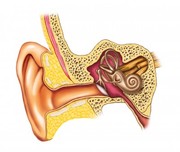|
To maintain our balance we use three senses our vision, joint position sensors in our legs and neck and our vestibular system.
The vestibular system is made up of the vestibular apparatus which include the semi circular canals and otoliths which detect movement and position of the head in relationship to gravity and the numerous nuclei and projections to the brain. If damage occurs to your vestibular system it can affect your balance and cause dizziness or vertigo. Common causes of vestibular disorders are BPPV (Benign paraoxsysmal positional vertigo), Vestibular neuritis or labryinthitis, menieres disease, migraines and some central neurological conditions including stroke, traumatic head injuries and MS. The vestibular system works in as a push pull system and if one side is affected it causes an imbalance to the messages the brain receives, this affects the stability of our eyes as we are moving and also our balance. Making it more difficulty to move around our environment. Fortunately there are specific exercises that can help reduce dizziness, vertigo and improve balance. This is generally referred to as Vestibular rehabilitation. The purpose of vestibular rehabilitation is to facilitate compensation after vestibular dysfunction has occurred. Evidence exists to support its effectiveness in a number of conditions. There is also evidence that suggests vestibular rehabilitation can be more effective than medication alone for long-term improvements in symptoms and function. If you have experienced dizziness or vertigo you know how debilitating and frightening it can be, we with a an assessment we could help reduce these symptoms and work with you to get you feeling your best, call us we can help.
0 Comments
Your comment will be posted after it is approved.
Leave a Reply. |
�
Categories
All
Archives
July 2023
|
|
Contact Us
Give us a call or send us an email to find out how we can help you on your rehab journey Phone 09 424 3254 [email protected] Visit us 3/55 Karepiro Drive, Stanmore Bay, Whangaparaoa |
Cancellation Policy:
Out of courtesy to your therapist, and other clients who may be waiting for an appointment, please inform us of cancellations as soon as possible.
Cancellations Charges: Short notice cancellations within 48 hours of your appointment or reschedules will incur a late cancellation fee of 60%.
For block bookings, one session will be deducted for three cancelled appointments.
Please be aware that ACC does not cover all cancelled appointments.
How to Cancel Your Appointment
If you need to cancel your appointment, please call us at 09 424 3254 between the hours of 8am – 5pm. If necessary, you may leave a detailed voicemail message. We will return your call as soon as possible.
Late Cancellations/No-Shows
A cancellation is considered late when the appointment is cancelled less than 48 hours before the appointed time. A no-show is when a patient misses an appointment without cancelling. In either case, we will charge the patient a 60% missed appointment fee.
Out of courtesy to your therapist, and other clients who may be waiting for an appointment, please inform us of cancellations as soon as possible.
Cancellations Charges: Short notice cancellations within 48 hours of your appointment or reschedules will incur a late cancellation fee of 60%.
For block bookings, one session will be deducted for three cancelled appointments.
Please be aware that ACC does not cover all cancelled appointments.
How to Cancel Your Appointment
If you need to cancel your appointment, please call us at 09 424 3254 between the hours of 8am – 5pm. If necessary, you may leave a detailed voicemail message. We will return your call as soon as possible.
Late Cancellations/No-Shows
A cancellation is considered late when the appointment is cancelled less than 48 hours before the appointed time. A no-show is when a patient misses an appointment without cancelling. In either case, we will charge the patient a 60% missed appointment fee.


 RSS Feed
RSS Feed
